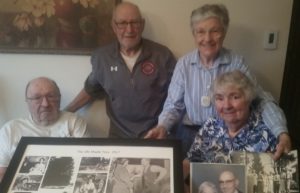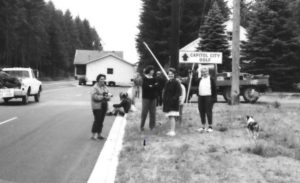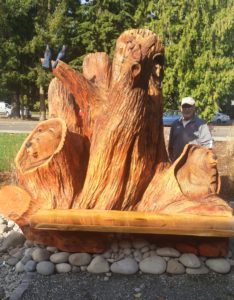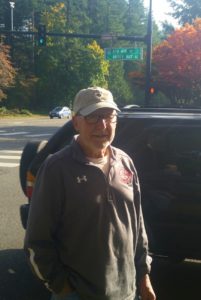Cast your mind onto the corner of 6th Avenue and College Way in Lacey. Traffic thickens at the corner all hours of the day and into the night, to the tune of about 36,500 vehicles a day.
 One corner marks the entrance to Saint Martin’s University, another the entrance to the Lacey Timberland Library. A bank hugs another corner and on the fourth, a community health center stands. Three short blocks away rises a chain-carved stump of what had been a huge maple tree.
One corner marks the entrance to Saint Martin’s University, another the entrance to the Lacey Timberland Library. A bank hugs another corner and on the fourth, a community health center stands. Three short blocks away rises a chain-carved stump of what had been a huge maple tree.
Look closely at the signs marking the intersection and you will see a sign on 6th Avenue: “Historical Name Robbins Road.”

And here our story begins, 115 years ago, with the arrival from Nebraska by train of Frank David and Sarah Jane Robbins. The couple came on that 1902 trip with six-week old baby Bill, and his 1 1/2-year-old brother Floyd, just seven years after Angus McDonald paddled his canoe from Shelton to become the first Saint Martin’s student.
What motivated them to move where almost no one they knew was living is uncertain, said Don Robbins. Don is one of Bill’s surviving sons, reminiscing with his sisters Dolores Roy and Joyce Steckler and Dolores’s husband Roland at the Roys’ Panorama apartment. They likely moved to be with close to Frank’s brother Ed, say the siblings, now in their 80s.
What is known is that they became one of the pioneer families of Thurston County, living a life that is almost unimaginable now.

Frank and Sarah homesteaded on 25 acres and eventually named the rutted trail that ran by their home Robbins Road. “It was kind of a driveway, really,” Dolores said. She says the road often became difficult to navigate after a rainy period.
“When they arrived, there was still virgin timber on the property,” Don says. So big were the stumps left from cutting, they had to be blasted using boxes of dynamite.
Their land was separated from Saint Martin’s University by only a sheep fence. It included what is now Interstate-5, businesses built along 6th Avenue and the Providence Regional Cancer Center and Clarus Eye Centre.

Back then an orchard, house, cellar and barns occupied the land. The Robbins had one of the best wells, dug about 15 feet down and so rich in water it supplied other families when their wells ran dry.
The siblings said their grandfather is best well remembered for “having one of the best team of horses in the area.” He used the horses to work the neighbors’ fields and pull a wagon that served as a school bus. Fruits and vegetables, grown by the family, were stored in the cellar; ice was scarce and refrigeration was not commonplace.
Bill married Emma Josephine Haas. Their brood eventually included seven brothers and sisters. The rhythm of life was much slower for those kids growing up.

They remember fondly climbing the 200-year-old maple. The kids built steps into the trunk so they could more easily climb to the lower branches. The tree was cut down this year after after a branch fell on the cancer center. A celebration was held in honor of the tree shortly before it was fallen.
They hunted and Don remembers ice skating on two nearby ponds along College Street.
Frank and Sarah left the land in 1938-39. He divided up much of the land among family members. He later sold the 10 acres he kept for $100,000. When Don sold his 3 1/3 acres much later (reduced to about 2.2 acres after the freeway took part of the land) he received $1 million.
They describe their father Bill as a “jack of all trades.”
“He never had much money,” Dolores said. He worked different job including at the Evergreen Ballroom and as a prison guard at McNeil Island. He even ran for Thurston County Commissioner once.

Don was in the service for many years and finished his work career as a Thurston County deputy. Roland and Dolores’s life revolved around his career in the service, both in uniform and then as a civilian. Joyce married Bernard Steckler, a professor at Seattle University until he retired. Bill’s sister Mildred married Archie Burfoot, who later donated the land for Burfoot Park.
Most of all, the siblings remember the sense of family. When Frank and Sarah and Bill and Emma lived there, the modern world had not yet been invented. They had no television to watch, no internet to scroll, no computer games to play. But they all had each other. “We were a very close family,” Dolores said.
Asked if they wish they could go back to the way it was when Frank and Sarah stepped off the train into what was virtual wilderness, Don said, “To go back to the way it was, yes. To go back to what it is now, no.”



















































